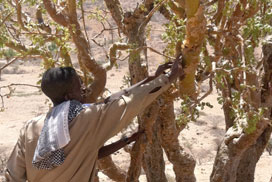As part of our commitment to return a percentage of our profits to the harvesting communities, we have implemented well building projects in various villages in Somaliland. Potable water is something many of us in developed countries take for granted. Until I visited Somaliland, I didn’t have an appreciation for how amazing it is that we can just turn on a faucet and clean, running water comes out. In Somaliland, especially in rural villages, people don’t have water taps in their entire village, let alone their house. When I stayed in Hargeisa, the capital, I was in a modest house that was lucky enough to have a spigot in the yard, and even a shower in the house. However, even in a city with more than one milliion people, there were times during the day that no water would flow from the spigot due to water shortages. It made me keenly aware of just how much we mindlessly use water in our daily lives. Aside from drinking and cooking (the obvious uses), washing our laundry and even flushing the toilet requires water. I was now in a place where I had to plan ahead for my water usage. I knew what time of the day there would be no water, so prior to that I would fill up the wash tub in the yard to do our laundry. I would fill the bucket next to the toilet to flush. We would fill large plastic jugs of water to have on hand throughout the day. And again, this is in the capital! Once you get out to rural villages, the closest stream to fetch water is literally miles away. So, everyday, women and girls take large yellow plastic jugs (that once held cooking oil), and walk miles to the nearest water source. There, they fill their jugs, and carry them miles back to their village. Have you ever carried a 5 gallon jug of water? It weighs over 40 pounds. These aren’t just girls, they’re Supergirls!
Aside from the back-breaking work of carrying these jugs, one of the most dire consequences of having this task fall on the shoulders (literally and figuratively) of young girls is that their opportunity to attend school is effectively non-existent. Water wins over education. This is something, as an American, I would not have naturally connected the dots between had I not been exposed to this issue. Simply having access to potable water in a village can change a girl’s life dramatically in that she now has the option to attend school. Mind blown.
This video is from one or our solar well projects in Somaliland.
This well was dug by hand; a gigantic feat considering the rocky soil in this region. Since then, we have purchased a mobile drill rig that can be hooked up to a vehicle and moved from village to village. This will help greatly as we embark on our next round of wells. We’ve finally secured the last of the materials (pipes, solar pumps, solar panels) that will now need to be packed up in a container and shipped by ocean to Somaliland. The logistics and planning that goes into these well projects literally takes years. There are many times that the pace makes me frustrated and stressed because we feel a sense of obligation to the people in Somaliland and want them to know how much we value them as partners and people. Without these harvesting communities, none of us would have the gift of frankincense, and Boswellness certainly wouldn’t be where we are today. This is what keeps us moving forward, no matter the pace, we have to have faith that it will all work out for everyone involved.
